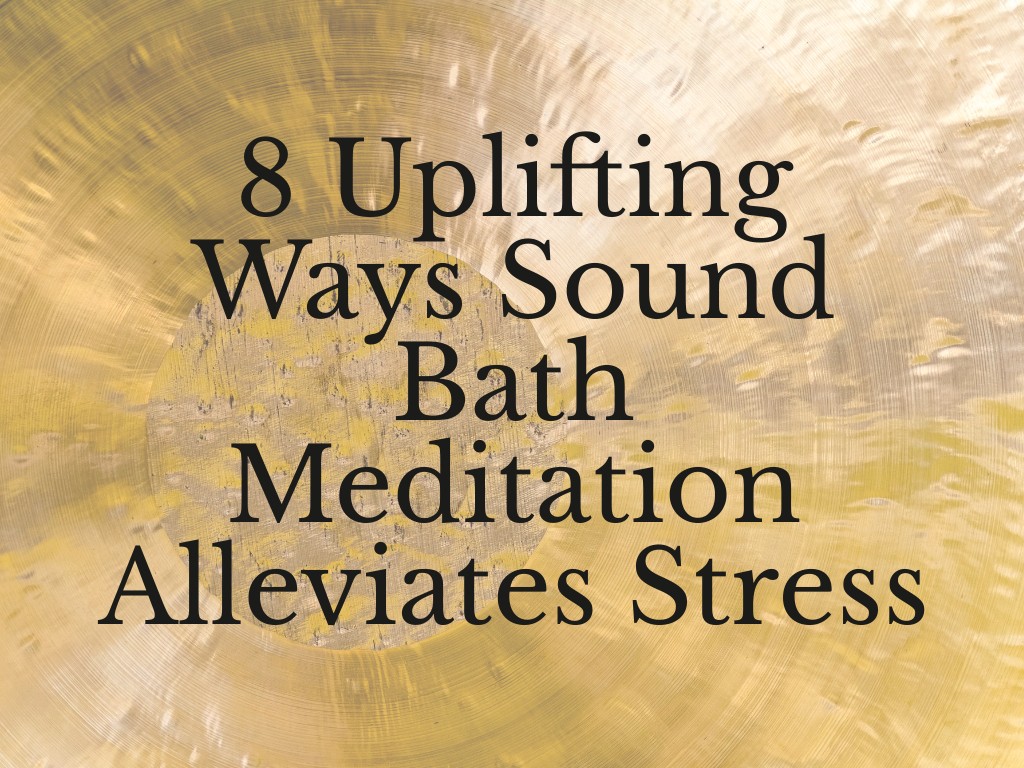Imagine you’re standing at the edge of a tranquil sea, the gentle waves lapping against the shore, each ripple washing away the tension in your body. That’s what sound bath meditation feels like—like being enveloped by soothing waves of sound that guide you toward deep relaxation.🔔

Key Highlights of Sound Bath Healing & Meditation
- 👉The Essence of Sound Healing – Discover how sound vibrations create a deep sense of calm and balance.
- 👉Unexpected Reactions – Learn why some people have intense emotional or physical responses to sound baths.
- 👉Who Should Approach with Caution – Understand the conditions that might make sound baths challenging for some individuals.
- 👉Common Misconceptions – Uncover what sound bath healing doesn’t do and how expectations shape the experience.
- 👉The Power of Surrender – Explore why openness and trust are key to experiencing the full benefits of sound healing meditation.

What is Sound Bath Meditation?
A sound bath meditation isn’t like a traditional bath where you soak your body in water—it’s a bath for your mind and soul. In this unique practice, sound waves from instruments like Tibetan singing bowls, gongs, chimes, and tuning forks are used to create healing vibrations that wash over you.
📻It’s not about listening to music in the usual sense—there are no lyrics, no beats.
Instead, it’s a deeply immersive experience where sound moves through you, and you let yourself sink into its rhythm. Imagine the sound as a river that flows through you, soothing every nerve, every cell, until you’re floating in a sea of calm, where the stress of the world is just a distant echo.🐳
Doesn’t it sound magical?

8 Ways Sound Bath Meditation Helps Stress and Emotional Healing
Sound bath meditation is a powerful tool for stress relief and emotional healing. Here are some ways it helps:
1. Deep Relaxation & Stress Reduction
- ✨The vibrations from sound waves (like singing bowls, gongs, or chimes) slow down brainwave activity, inducing a meditative state that calms the nervous system.
- ✨Lowers cortisol levels, reducing feelings of stress and overwhelm.
2. Emotional Release & Healing
- ✨Sound frequencies help release stored emotions and trauma by promoting energetic balance in the body.
- ✨Certain tones resonate with different chakras, helping to unblock emotional stagnation.
3. Anxiety & Depression Relief
- ✨The soothing sounds shift focus away from negative thoughts, reducing anxiety.
- ✨Binaural beats and harmonic frequencies stimulate the brain’s production of serotonin and dopamine, promoting a sense of well-being.
4. Improved Sleep & Insomnia Relief
- ✨The deep relaxation response makes it easier to fall asleep and stay asleep.
- ✨Certain frequencies, like 432Hz or 528Hz, are known to promote restful sleep patterns.
5. Mental Clarity & Focus
- ✨The meditative state achieved during a sound bath enhances mental clarity and helps break cycles of overthinking.
- ✨Encourages mindfulness, allowing for a more centered and present mindset.
6. Restores Energy & Rebalances Chakras
- ✨Vibrational healing is believed to restore balance to the body’s energy centers (chakras), helping you feel more aligned and energized.
- ✨Each instrument produces different frequencies that correspond to different parts of the body and mind.
7. Lowers Blood Pressure & Heart Rate
- ✨Studies suggest that sound therapy can help lower blood pressure and heart rate by activating the parasympathetic nervous system.
- ✨This can help with overall heart health and reduce physical symptoms of stress.
8. Supports Meditation & Spiritual Growth
- ✨Helps beginners enter a meditative state without struggle, as the sound naturally guides the mind into stillness.
- ✨Can deepen spiritual connection by creating a sense of inner peace and harmony.

What Sound Healing Meditation Won’t Do
While sound bath meditation is a powerful tool for relaxation and healing, there are a few things it doesn’t do. Let’s break them down:
1. 👉It Doesn’t Fix Everything Immediately
A sound bath won’t instantly erase years of stress, trauma, or emotional baggage. Think of it as a gentle reset, a moment to clear the mind and start fresh, but it’s not a magic pill. It’s like tending to a garden—it helps clear the weeds, but consistent care is needed for long-term growth.
2. 👉It Doesn’t Require You to “Do” Anything
You don’t have to work hard at it. In fact, one of the beautiful things about sound baths is that they don’t require any active participation. You simply let go and absorb the vibrations. So, if you’re looking for something that’s more active, like a workout or something you have to “figure out,” sound baths might not be for you.
3. 👉It Doesn’t Solve Physical Health Issues
While sound bath meditation can promote relaxation and help with stress-related ailments, it’s not a substitute for medical treatment. Think of it like a cozy blanket for your soul—it makes you feel good, but it doesn’t replace a doctor’s care when something physical needs attention.
4. 👉 It Doesn’t Silence Your Thoughts (All the Time)
Sometimes, despite the calming tones, our minds still wander. A sound bath can help you enter a state of deeper relaxation, but it doesn’t promise to silence every thought. It’s more like a peaceful background hum, inviting stillness, but your mind may still dance a little.
5. 👉 It Doesn’t Fix Your Relationships
It might help you release emotional tension, but sound bath meditation won’t directly solve relationship struggles or communication issues. It’s more like a personal reset, creating space for you to heal emotionally, which can later benefit your relationships—but it’s not a conversation or conflict resolution tool.
6. 👉 It Doesn’t Expect You to “Feel” a Certain Way
There’s no right or wrong experience during a sound bath. You might feel deeply relaxed, or you might find yourself drifting into contemplation. It doesn’t promise a specific outcome—it’s more about what you need in the moment, without pressure. It’s like tuning into your own unique rhythm without the expectation of being in perfect harmony.

Why Some People Feel Strange After Sound Healing Meditation
While sound bath meditation is typically a deeply relaxing and healing experience, some individuals may have negative experiences. Here’s why that might happen:
1. ⚡Emotional Release (Unexpected Intensity)
Sound baths can sometimes trigger the release of deep-seated emotions, memories, or past traumas. This can lead to an emotional purge, which might feel overwhelming or even uncomfortable. Imagine it like a storm stirring up an otherwise calm sea—sometimes, the release of pent-up emotions can feel intense and raw, especially if someone isn’t prepared for it.
2. ⚡Feeling Overstimulated by the Sound
For some, the frequencies and vibrations of a sound bath can be overwhelming. The intense sound waves might feel like too much stimulation for sensitive individuals, causing discomfort rather than calm. It’s similar to being in a room where the music is too loud—it can create a sense of anxiety or discomfort instead of peace.
3. ⚡Not Being Able to Relax
Some people may find it difficult to “let go” during a sound bath. Their minds may wander, or they may struggle to relax enough to feel the full benefit of the vibrations. It can be frustrating if you’re expecting to feel calm and instead find yourself feeling restless or anxious. This might be more common for those who struggle with meditation or have a busy mind that’s hard to quiet down.
4. ⚡Physical Sensitivity
The vibrations from sound instruments, like singing bowls or gongs, are powerful. While they can feel soothing for many, those who are physically sensitive—especially people with chronic pain or conditions like fibromyalgia—might find the vibrations uncomfortable or jarring. It’s like feeling the hum of a heavy machine when you’re close to it; it can be too intense for some.
5. ⚡Expectations vs. Reality
If someone goes into a sound bath with high expectations of immediate relief or a profound, transformative experience, they may be disappointed if they don’t feel the results they expected. Sometimes the experience is subtle and gradual, which can be frustrating if you’re looking for a quick, dramatic change. Sound baths don’t promise instant fixes—they’re more about allowing you to sink into the experience without pressure.
6. ⚡Personal Discomfort with the Sound or Vibration
Certain frequencies or instruments might just not resonate with everyone. Not everyone will connect with the same sounds or vibrations, and it’s possible that the particular set of sounds used in a sound bath doesn’t work well for an individual. For example, some might find the gong too intense, or the chimes too high-pitched. It’s similar to how some people find certain music genres relaxing while others find them annoying.
7. ⚡Lack of Preparation or Readiness
For those new to sound baths or meditation in general, the experience might feel strange or alien. If someone isn’t mentally or emotionally prepared for the experience, they may feel unsettled rather than calm. Sometimes, entering into a sound bath with a sense of resistance or uncertainty can prevent full relaxation, leading to frustration or a feeling of disconnect.
8. ⚡Health or Medical Conditions
As mentioned before, for people with certain conditions—like anxiety, PTSD, or neurological disorders—the deep vibrations might stir up emotions or sensations that are difficult to process in the moment. The body may react in unexpected ways, creating a feeling of unease instead of relaxation.
It’s important to remember that everyone’s experience with sound baths is unique, and if you have a negative experience, it doesn’t mean it’s a bad practice overall—it might just be a sign that your body and mind need a different approach, or you might want to try a different type of sound bath that resonates better with you.

Sound Baths Aren’t For Everyone
Sound baths are incredibly soothing, but there are a few groups of people who should either avoid them or approach with caution. Here’s a breakdown:
1. 💡People with Seizure Disorders
If you have a condition like epilepsy or are prone to seizures, you may want to avoid sound baths or consult with a healthcare provider before trying them. The intense vibrations and frequencies could trigger a seizure in some people, especially with certain sound frequencies.
2. 💡Pregnant Women (With Caution)
While sound baths are generally safe, pregnant women, especially those in the early stages of pregnancy, should approach with care. The deep vibrations might be overwhelming for some, or could affect the fetus in ways that are not fully understood. It’s always a good idea to check with a doctor before participating.
3. 💡People with Certain Mental Health Conditions
If you have a mental health condition like severe anxiety, PTSD, or psychosis, sound baths could sometimes stir up strong emotions or memories. While the practice is designed to promote healing and relaxation, it might not be suitable for everyone—particularly if you’re struggling with intense emotions that could be triggered by the sounds. Speaking with a therapist or mental health professional beforehand could be helpful.
4. 💡People with Hearing Impairments
If you have significant hearing loss, you might not be able to fully experience the effects of a sound bath, as the practice relies on specific frequencies and vibrations to create healing effects. However, some people with hearing impairments still benefit from the vibrations they feel in their body, so it’s a personal choice depending on the level of impairment.
5. 💡People with Pacemakers or Implanted Medical Devices
The vibrations from sound baths can potentially interfere with the functioning of pacemakers or other implanted medical devices. It’s a good idea to consult with a healthcare provider if you have any such devices before participating in a sound bath.
6. 💡Those Looking for a “Quick Fix”
Sound baths aren’t a one-time solution for deep emotional or physical issues. If you’re seeking a fast fix to complex problems (like chronic pain, severe stress, or relationship issues), sound baths won’t be the ultimate answer. They’re a tool for overall well-being, but real healing often requires consistent work beyond the experience itself.
7. 💡People Who Aren’t Open to the Experience
Sound baths work best when you’re open to the experience and able to relax. If you’re resistant to the idea, or you feel like you’re “forcing” yourself to be calm, it might not be the right time. It’s about being receptive to the vibrations, and sometimes, it takes a little time for your mind to let go of tension.
🚀If you’re unsure about whether sound baths are right for you, it’s always a good idea to consult a professional or health provider who knows your personal health history.

Final Thoughts
Sound bath healing meditation offer us a gentle journey into deep relaxation and emotional clarity. While the experience can be profoundly soothing, it’s important to approach it with an open mind and heart, allowing the vibrations to guide you at your own pace.
Like any practice, it’s not about expecting instant fixes or forcing yourself into a specific outcome. Sound healing meditation is about surrendering to the moment, feeling the waves of sound wash over you, and trusting that the experience will unfold in the way that is most beneficial for you.
Each session is unique, just like you. On days when it feels difficult or different, the vibrations are still working in subtle ways, bringing you closer to balance and peace.

FAQ: Sound Bath Meditation & Sound Healing Meditation
1. What is sound bath healing?
Sound bath healing is a meditative experience where calming vibrations from instruments like singing bowls and gongs help relax the mind, ease stress, and promote emotional and energetic balance.
2. Do I need experience with meditation for sound healing meditation?
Not at all! Sound healing meditation requires no effort—just lie back, listen, and let the vibrations naturally guide you into a state of relaxation and inner peace.
3. Can sound bath healing reduce anxiety and stress?
Yes! The soothing tones slow brainwaves, calm the nervous system, and create deep relaxation, making sound bath healing an effective tool for stress relief and emotional well-being.
4. Why did I feel emotional during sound healing meditation?
Sound vibrations can release stuck emotions, bringing old feelings to the surface. It’s a natural part of sound healing meditation and a sign of emotional energy clearing.
5. Does sound bath healing cure physical pain?
While sound bath healing can help relax the body and reduce tension, it’s not a medical treatment. It works best as a complementary practice alongside other healing methods.
6. What if I don’t feel anything during a sound healing meditation?
That’s completely normal! Some feel immediate effects, while others experience gradual shifts. Each session is different, and sound healing meditation works in subtle ways.
7. Are there risks with sound bath healing?
Most people find it relaxing, but those with seizures, pacemakers, or high sensitivity to sound should consult a doctor before trying sound bath healing.
8. What if the sounds feel too intense during sound healing meditation?
If the vibrations feel overwhelming, focus on your breath or adjust your position. Sound healing meditation should feel soothing, so listen to your comfort level.
9. Can I practice sound bath healing at home?
Yes! You can use singing bowls, tuning forks, or recorded sound bath healing sessions to create a peaceful experience right in your own space.
10. How often should I do sound healing meditation?
There’s no set rule. Some enjoy sound healing meditation weekly, while others use it as needed for relaxation and energy clearing. Listen to your body’s needs!






